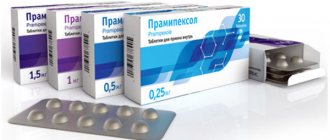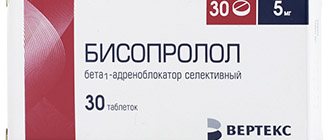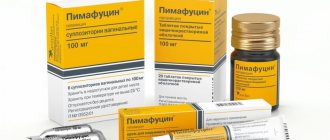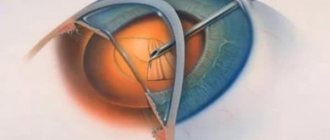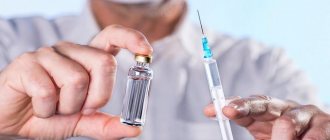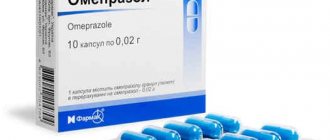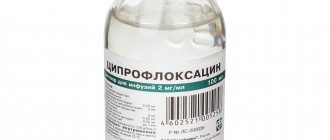Has restrictions during pregnancy
Prohibited during breastfeeding
Has restrictions for children
Has restrictions for older people
Prohibited for liver problems
Prohibited for kidney problems
Propazine is an antipsychotic that is used in the treatment of mental disorders of various etiologies. According to the instructions for use, Propazin is also effective in treating alcoholism and relieving symptoms of withdrawal symptoms, as well as for stopping vomiting.
Release forms and components
This medicine is supplied to pharmacies and clinics in three main forms:
- in the form of tablets;
- dragee;
- solutions for injections.
The main active ingredient of the drug is promazine. It can be included in tablets in quantities of 25 or 50 mg. The medicine also contains additional substances such as calcium stearate, milk sugar, potato starch, stearic acid, talc, indigo carmine.
The medicine can be packaged in this form in blister packs of 10 pcs. or in jars of 50 pcs.
How the medicine works and indications for use
Doctors usually prescribe this medicine to patients in a state of chronic or acute psychosis, occurring against the background of psychomotor agitation, delusions and hallucinations. Propazine is also prescribed for panic attacks. This drug is believed to be very effective in treating manic episodes and depression. Once in the human body, the medicine has the following effect:
- hypotensive;
- hypothermic;
- antiallergic;
- antiemetic;
- sedative;
- m-anticholinergic.
Propazin has an antipsychotic effect on the human body due to the blockade of dopamine D2 receptors in the mesolimbic and mesocortical systems. The result of taking this medicine is a decrease in anxiety, feelings of fear, and tension. The drug also reduces the manifestations of diseases such as depressive psychosis - hallucinations and delusions. In addition, the medicine helps lower blood pressure during panic attacks.
Most often, schizophrenia and psychomotor agitation are treated with the use of the drug “Propazin”. But in some cases, this medicine may be prescribed as part of maintenance therapy in the treatment of debilitated patients, the elderly and children.
Overdose
Patients prescribed this drug must strictly follow the doctor's instructions. Any deviations from the prescriptions can provoke quite unpleasant symptoms.
As a rule, an overdose of the drug “Propazin” is characterized by the following manifestations:
- Hyperreflexia or areflexia.
- Fuzzy visual perception.
- Cardiotoxic pathologies (arrhythmia, decreased blood pressure, heart failure, shock, tachycardia, ventricular fibrillation, changes in the QRS wave, cardiac arrest).
- Confusion.
- Neurotoxic effect. Agitation may occur.
- Convulsions, disorientation, stupor, drowsiness, coma.
- Mydriasis, hypothermia or hyperpyrexia, dry mouth, vomiting.
- Muscle stiffness.
- Respiratory depression or pulmonary edema.
With such symptoms, a person needs medical attention. It is recommended to rinse the patient’s stomach (if the overdose was caused by taking pills or pills). Another necessary measure is to take activated carbon.
To eliminate the negative manifestations that have arisen, the doctor prescribes symptomatic treatment.
Contraindications
Prescribing this antipsychotic drug, like any other, is not allowed in all cases. Contraindications to its use are:
- severe diseases of the cardiovascular system;
- pronounced depression of the central nervous system;
- comatose states;
- hypersensitivity to components.
This medicine is not prescribed for children under 12 years of age. It should also not be taken by pregnant women and patients during lactation.
In some cases, this medicine can be prescribed, but with caution. Careful monitoring should be carried out for people taking this medication and at the same time suffering from the following diseases:
- alcohol addiction;
- breast cancer;
- blood pathologies;
- Reye's syndrome;
- Parkinson's disease;
- lung pathologies;
- renal or liver failure.
Also, with caution, the instructions for use of the drug “Propazin” prescribe it to be prescribed to persons with stomach or duodenal ulcers.
Consumer Opinion
From all of the above, it is clear how the drug “Propazin” is positioned in the instructions for use. Treatment and patient reviews are always of interest. Is the drug really effective? Let's consider what people to whom it was prescribed say about the drug "Propazin".
Patients' opinions about this remedy vary. Some patients claim that the drug is very effective in relieving psychosis, severe mood swings, and eliminating constant irritation. Moreover, this category of patients assures that improvement in their condition occurred after approximately 2 weeks of regular use of the medicine. However, doctors prescribe medication, as a rule, for 2-3 months. This type of therapy provides excellent results. Patients claim that treatment with this remedy allows them to forget about unpleasant symptoms for a long time.
Another category of people believes that the medication is not effective enough. It is not able to eliminate the symptoms of depression. In addition, such patients indicate the occurrence of unpleasant side effects. Most often, people experience drowsiness and lethargy. However, it is difficult to say whether such a reaction is really provoked by the drug “Propazin”. After all, most often the course of therapy includes several medications.
What side effects does the medicine have?
In some cases, this drug can have a negative effect on the patient's body. "Propazine" sometimes has the following side effects:
- catalepsy;
- headache;
- decreased motivation;
- dizziness;
- vomiting, nausea, diarrhea;
- decreased blood pressure;
- collapse;
- galactorrhea;
- skin pigmentation.
Next, we’ll talk in more detail about the dosage regimen and dosage.
Side effects
The use of this medicine may negatively affect some important systems. Therefore, the patient's condition should be carefully monitored during therapy. Any negative manifestations should be reported to your doctor immediately. After all, only a doctor can prescribe or cancel the medicine “Propazine”.
Instructions for use of the drug provide the following list of side effects:
- dizziness, catalepsy, extrapyramidal disorders, decreased motivation, headache;
- priapism;
- nausea, diarrhea, vomiting, loss of appetite, intestinal atony, abdominal pain, cholestatic hepatitis;
- agranulocytosis, anemia;
- collapse, decreased pressure;
- amenorrhea, galactorrhea;
- photosensitivity, skin pigmentation.
The drug "Propazin": instructions for use
These tablets should be taken after meals. Doctors usually prescribe 1 piece of 25 or 50 mg to patients. The frequency of administration is 1-4 times a day. Subsequently, the dose can be gradually increased to 400-600 mg per day. A patient can take a maximum of 1000 mg of this medicine per day. For elderly and weakened people, the drug is usually prescribed in smaller dosages.
The instructions for use recommend intramuscular injections of “Propazin” for adults and children over 12 years of age every 4-6 hours. The maximum dose in this case is also 1000 mg.
Similar drugs:
- Eglonil Oral tablets
- Finlepsin Oral tablets
- Moditen depo Solution for intramuscular administration
- Egolanza Oral tablets
- Rispaksol Oral tablets
- Thiodazine Oral tablets
- Closasten (Closastene) Oral tablets
- Clopixol Depot Solution for intramuscular administration
- Thioridazine Oral tablets
- Leponex Oral tablets
** The Drug Directory is intended for informational purposes only. For more complete information, please refer to the manufacturer's instructions. Do not self-medicate; Before starting to use the drug Propazine, you should consult a doctor. EUROLAB is not responsible for the consequences caused by the use of information posted on the portal. Any information on the site does not replace medical advice and cannot serve as a guarantee of the positive effect of the drug.
Are you interested in the drug Propazine? Do you want to know more detailed information or do you need a doctor's examination? Or do you need an inspection? You can make an appointment with a doctor - the Euro lab is always at your service! The best doctors will examine you, advise you, provide the necessary assistance and make a diagnosis. You can also call a doctor at home . Euro lab clinic is open for you around the clock.
** Attention! The information presented in this medication guide is intended for medical professionals and should not be used as a basis for self-medication. The description of the drug Propazine is provided for informational purposes and is not intended for prescribing treatment without the participation of a doctor. Patients need to consult a specialist!
If you are interested in any other drugs and medications, their descriptions and instructions for use, information about the composition and form of release, indications for use and side effects, methods of use, prices and reviews of drugs, or you have any other questions and suggestions - write to us, we will definitely try to help you.
Interaction with other medications
When prescribing Propazin to a patient, the doctor must keep in mind that he:
- enhances the effect of sleeping pills, narcotic analgesics, general anesthesia, antiepileptic drugs, ethanol, anxiolytics;
- reduces the effectiveness of anorexigenic drugs.
It is not recommended to prescribe this remedy simultaneously with Apomorphine. The fact is that “Propazin” weakens the emetic effect of the latter and at the same time enhances its inhibitory effect on the central nervous system. In combination with thiazide diuretics, this medicine is prescribed with caution. The same applies to tricyclic antidepressants, MAO inhibitors, antihistamines containing amitriptyline, amantadine, sympathomimetics, beta-blockers.
Drug interactions
When Propazin is used together in therapy with other medications, the following manifestations are possible:
- medications that depress the central nervous system - a state of apathy and depression develops, and the performance of the respiratory system decreases;
- the effect of analgesics, antihistamines, and antihypertensive drugs is enhanced;
- medications that provoke extrapyramidal disorders - the frequency and intensity of these disorders increases;
- Bromocriptine activity decreases;
Bromocriptine - antidepressants, as well as MAO inhibitors, increase the risk of developing neuroleptic syndrome several times;
- the effect of Amphetamine is reduced and the activity of the respiratory system is inhibited;
- with simultaneous administration, the anticonvulsant effect of Ephedrine is reduced;
- the antiparkinsonian effect of Levodopa decreases several times;
- during combination therapy with Procloperazine, the patient loses consciousness for a long period of time;
- anticonvulsant – there is a significant decrease in the seizure threshold;
- Joint therapy with antidiarrheal medications and absorbent medications should not be prescribed;
- It is strictly forbidden to drink any drinks containing alcohol during treatment with Propazine.
What precautions should be taken when taking
When high doses of this drug are used in mentally ill people, extrapyramidal disturbances (tremors, shuffling, repetitive movements) may occur. If such symptoms occur, the dose of the drug must be reduced. If the patient’s disorder is too pronounced, treatment with this medication should be discontinued.
The antipsychotic drug Propazin also has, among other things, moderate antiemetic properties. Therefore, while taking it, the doctor may not pay attention to the negative impact of other toxic drugs on the patient. Also, this property of the drug masks the manifestations of certain diseases, for example, intestinal obstruction.
Between the third and tenth weeks of treatment with Propazin, patients develop agranulocytosis. During this time, patients should monitor how they feel and if they develop symptoms of infection or sore throat, notify their doctor. If the number of leukocytes in the blood decreases too much during treatment with Propazin, it should be stopped immediately.
Oral tablets Propazinum
Instructions for medical use of the drug
Description of pharmacological action
Antipsychotic (neuroleptic). Has an antipsychotic, sedative effect, reduces motor activity. In addition, it has antiemetic, hypothermic and antihistamine effects.
Indications for use
Mental illnesses accompanied by psychomotor agitation (especially in mild cases), for maintenance therapy, as well as in debilitated patients, the elderly and children.
Release form
film-coated tablets 25 mg; dark glass jar (jar) 50 cardboard pack 1; film-coated tablets 25 mg; contour packaging 10 cardboard pack 5; film-coated tablets 50 mg; contour packaging 10 cardboard pack 5;
Pharmacodynamics
Reduces manifestations of psychosis: delusions and hallucinations. The antipsychotic effect is associated with the blockade of dopamine D2 receptors in polyneuronal synapses of the chemoreceptor trigger zone of the brain. Inhibition of dopamine receptors in the nigrostriatal and tubuloinfundibular zones causes extrapyramidal disorders and hyperprolactinemia, central adrenergic and serotonergic receptors - a decrease in fear, anxiety, and tension. Peripheral alpha-adrenergic blocking and H1-histamine blocking effects are manifested by a decrease in blood pressure and an antiallergic effect. It has a strong sedative, anticholinergic and hypotensive effect, and a moderate antiemetic effect.
Pharmacokinetics
Plasma protein binding - 90%. Cmax is reached after 2–4 hours. It undergoes biotransformation in the liver with the formation of inactive metabolites. Excreted mainly by the kidneys.
Use during pregnancy
During pregnancy, it is possible only if the benefit to the mother outweighs the potential risk to the fetus. During treatment you should stop breastfeeding.
Contraindications for use
Liver and kidney diseases, gastritis, chronic heart failure in the stage of decompensation, arterial hypotension.
Side effects
From the nervous system and sensory organs: drowsiness (usually disappears with continued therapy and/or with dose reduction), extrapyramidal disorders (including pseudoparkinsonism), dysarthria, dyskinetic disorders (see "Precautions"), tardive dyskinesia, paradoxical reaction, cerebral edema, seizures (especially in patients with EEG abnormalities or a history of epilepsy), catalepsy, decreased motivation, headache, dizziness, increased intraocular pressure. From the cardiovascular system and blood (hematopoiesis, hemostasis): decreased blood pressure, orthostatic hypotension (usually after the first parenteral administration), inhibition of bone marrow hematopoiesis (agranulocytosis, anemia), prolongation of the QT interval - the risk of developing ventricular arrhythmias (especially in background of initial bradycardia, hypokalemia, prolonged QT interval). From the genitourinary system: bladder atony, priapism, amenorrhea, galactorrhea. From the gastrointestinal tract: nausea, vomiting, diarrhea, abdominal pain, dry mouth, cholestatic hepatitis, intestinal atony. Allergic reactions: photosensitivity, skin pigmentation. Other: breast swelling and amenorrhea in women, gynecomastia in men, false positive pregnancy test, hyperglycemia/hypoglycemia, glycosuria, increased appetite and body weight. When taking phenothiazine antipsychotics, cases of sudden death (including those possibly caused by cardiac causes) have been reported.
Directions for use and doses
Orally 25-50 mg 2-4 The maximum single dose for adults is 250 mg, daily dose is 2 g.
Overdose
Not described.
Interactions with other drugs
When used simultaneously with drugs that have a depressant effect on the central nervous system (including anxiolytics, opioid analgesics, hypnotics, anticonvulsants, anesthetics), the depressant effect on the central nervous system may be enhanced. With the simultaneous use of drugs that have hepatotoxic and nephrotoxic effects, the nephrotoxic and hepatotoxic effects are enhanced. When used simultaneously with suxamethonium, a case of prolonged apnea has been described.
Precautions for use
While the sedative effect of promazine is generally desirable, in some cases promazine may cause unwanted drowsiness. Extrapyramidal disorders have been reported in hospitalized psychiatric patients when high doses were used. These symptoms were reversible and resolved with dose reduction or additional administration of antiparkinsonian drugs. If symptoms are severe, treatment with promazine should be discontinued. In rare cases, persistent dyskinesia (involving the face, tongue, jaws), which is irreversible, has been observed, especially in elderly patients with previous brain damage. The use of phenothiazines in patients with a history of epilepsy is possible only for absolute indications; in these cases, concomitant adequate anticonvulsant therapy is necessary. Promazine should be used with caution in patients working in conditions of elevated temperature, as well as in those who have contact with phosphorus-containing insecticides (promazine can potentiate the effects of organic phosphates). The antiemetic effect may mask the symptoms of toxicity of other drugs and complicate the diagnosis of other diseases (for example, intestinal obstruction). Agranulocytosis develops between the 4th and 10th weeks of therapy. During this period, patients should be especially careful to monitor for sore throat or symptoms of infection. If the number of leukocytes decreases significantly, the drug should be discontinued and appropriate therapy should be started.
Storage conditions
List B: In a dry place, protected from light, at a temperature not exceeding 25 °C.
Best before date
36 months
ATX classification:
N Nervous system
N05 Psycholeptics
N05A Antipsychotic drugs
N05AA Phenothiazine derivatives with aliphatic structure
N05AA03 Promazine
Reviews from patients about the drug
Most patients with anxiety and panic attacks find this remedy quite effective. In comparison with the popular and often prescribed by doctors "Aminazin", "Propazin" is considered a lighter drug. According to many patients, it has many side effects, and it has a rather negative effect on the body. However, it still acts much more sparingly than many other medications in this group. Analogues capable of serving as a worthy replacement for the drug “Propazin” are, unfortunately, practically not produced by the pharmacological industry at present. With PA, as many patients believe, there are, for example, no alternatives.
In addition to its effectiveness, many patients and doctors also note that the advantages of this drug are that it is not addictive. This drug is also very good, judging by the reviews, in helping patients with sleep disorders. It removes delusions and hallucinations worse, but still quite effectively. This medicine calms the nervous system, according to many patients, in much the same way as any other typical antipsychotic.
The absence of the need for additional use of any correctors that relieve unwanted side effects (cyclodol, akinetone, etc.) is also why the drug “Propazin” has earned good reviews from patients.
Doctors' opinion
Psychiatrists also speak relatively well about this medicine. According to doctors, the drug “Propazin” is excellent for treating mainly borderline pathologies. Doctors believe that it is quite effective, including those patients whose behavior displays elements of hostility and aggression. This medicine also helps a lot with diseases such as depressive psychosis. According to experts, this drug causes fewer side effects than many other similar medications.
